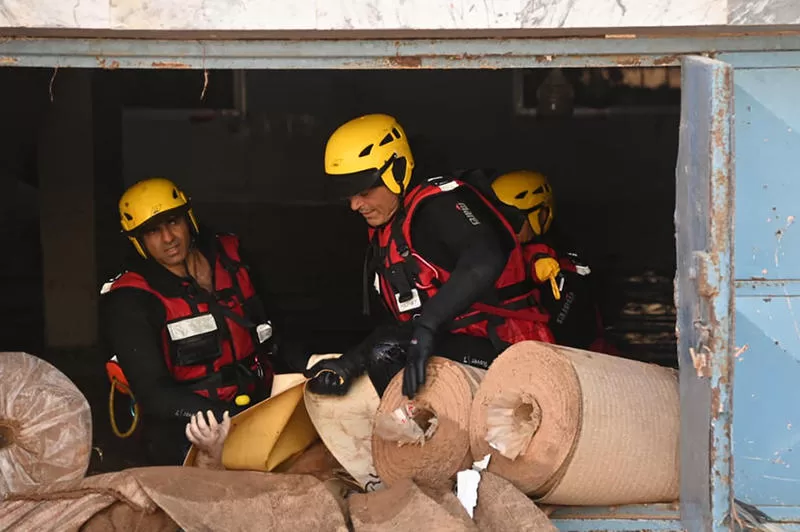Residents and rescuers in the devastated Libyan city of Derna struggle to cope with thousands of bodies being washed away or decomposing under rubble after a flood that destroyed buildings and swept people into the sea, as the United Nations said Libya needs primary health care to prevent a cholera outbreak among survivors, Reuters reports.
Rescue teams from Tunisia are searching for human remains in the waters between the rubble in LibyaPhoto: AFP / AFP / Profimedia
The World Health Organization and other aid groups have urged Libyan authorities to stop burying flood victims in mass graves, saying they could cause long-term psychological distress to families or pose health risks if they are located near water.
A UN report said more than 1,000 people have so far been buried this way since Libya, a nation divided by a decade of conflict and political chaos, was hit last Sunday by torrential rain that caused two dams to burst.
Thousands of people have been killed and several thousand more are reported missing.
“Bodies are scattered in the streets, brought back to shore and buried under collapsed buildings and rubble. In just two hours, one of my colleagues counted over 200 bodies on the beach near Derna,” said Bilal Sablouh, Forensic Manager for Africa at the International Committee of the Red Cross.
Ibrahim al-Arabi, the health minister of Libya’s Tripoli-based western government, told Reuters it was certain the groundwater was polluted with water mixed with corpses, dead animals, waste and chemicals. “We urge people not to go near the wells in Derna,” he said.
Mohammad al-Qabisi, the head of Derna’s Wahda Hospital, said there were fears that waterborne diseases would spread, but no cholera cases had been reported so far.
Areas of Derna, the epicenter of the destruction caused by the floods in eastern Libya, were destroyed when the dams above the city broke, and the flood that swept a usually dry riverbed brought down entire blocks of houses as families they were sleeping
The International Organization for Migration’s mission in Libya said more than 5,000 people were presumed dead, with 3,922 deaths recorded in hospitals and more than 38,640 displaced from the flood-hit region.
The actual death toll could be much higher, officials say.
Warnings about mass burials
“We should be afraid of an epidemic,” said Nouri Mohamed, 60, at a bakery offering free bread. “There are still corpses under the ground… Now there are corpses that are starting to smell.”
The UN health agency, along with the ICRC and the International Federation of Red Cross and Red Crescent Societies, called for the funerals to be better managed.
“We urge authorities in communities affected by the tragedy not to rush ahead with mass burials or mass cremations,” said Kazunobu Kojima, medical officer for biosecurity in the WHO’s Health Emergencies Programme.
The Norwegian Refugee Council, which has a 100-strong team in Libya, said the management of the bodies was the most pressing concern.
“I heard from my team that there were mass graves where rescue workers were appealing, ‘Don’t bring us food, don’t bring us water, bring us body bags,'” said Ahmed Bayram of the NRC.


